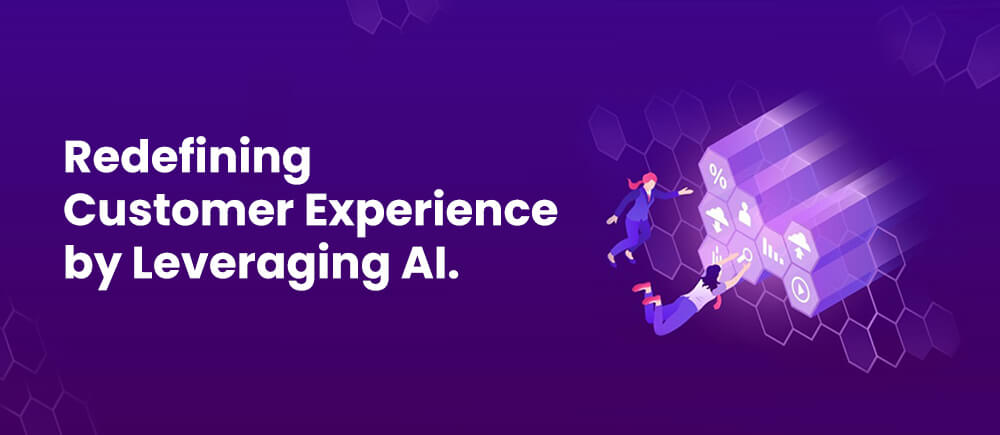
Informed and convenient customer experience becomes a vital asset when your primary goal is to add customers around the clock. For any business, it is one of the most essential things. Generally, at a time, your employees are managing many tasks. In such thick of things, providing close attention to every lead or opportunity is not an easy job.
Considering this, many organizations started investing in automated self-service. They are leveraging AI to automate customer interactions and improve customer experience. Servion clearly states, 95% of all customer interactions will, in fact, be powered by AI by the year 2025.
Businesses today acknowledge the tremendous value and ROI that great customer experience can generate. This is the reason why a great number of them are making use of AI at various touchpoints of the customer journey.
Gartner has envisioned 85% of customer interactions to take place without the need for human intervention by the end of this year. AI’s successful implementation in customer experience, though, depends on three foundational capabilities, namely business interaction, data unification, and real-time information. Let’s look at how AI can transform it for the better.
4 Ways to Redefine Customer Experience by Leveraging AI
Whether you might know it or not, AI is a regular feature in our daily lives today. It can do everything from learning your preferences to making suggestions based on that information. If you have interacted with Google Home or Alexa, you know that we’re talking about data annotation here.
But, how are companies using AI to enhance customer experience? Moreover, how can you do the same for your business? Here, we will look at four ways you can leverage AI to redefine the customer experience.
1. Predictive Personalization
To provide a holistic and customized experience you must study your customer’s behavior and mold your offerings, accordingly. That’s why there is no surprise when 71% of B2B customers say that they interested in using AI for personalization while another 63% of them want to use it to identify trends.
Predictive personalization can empower organizations to study the behavior of users and then predict their actions based on it. Today, organizations are efficiently using AI to enhance CX by integrating it within every touchpoint of the customer journey. Almost 31% of marketers identifying the practice to help them get a better understanding of the customer.
AI-enabled personalization can be so effective that it can make customers feel that the service or brand experience was tailored for them. The most robust example of this is Amazon’s algorithm that personalizes the retail experience for shoppers by recommending them products.
Their work has paid off, too, with Amazon claiming that 35% of their revenue came from these recommendations. Customers, on the other hand, seemed to wax lyrical over it, by saying that they would return because of the satisfaction that a personalized experience provided them.
2. Improved CX With AI-Powered Virtual Assistants
AI’s potential to combine the power of predictive analysis and customer insights to boost customer experience is almost unreal. With it, you can study customer behavior to automate common queries. It will enable users with product knowledge to better serve themselves. In fact, almost 83% of organizations could find greater engagement if they provided better in-person service.
Integrating this information with a knowledge base software and deploying it through an AI-enabled chatbot can help you make it easily available to the customer. Not only is a knowledge base a great way to empower customers, but it also helps businesses save over 30% in support costs. It reduces the turnaround time through chatbots that can automate almost 80% of routine questions.
3. Automated Email Content Curation
Did you know, according to 80% of marketers, content personalization is more effective in targeting customers?
With the help of machine learning, you can design algorithms to track the user’s website and email browsing data to understand the kind of content they engage with. This information enables the algorithm to identify relevant content and target the customer with personalized emails.
In fact, using AI to segment and customize email has been found to increase click-through rates by as much as 14%. Apart from that, AI is being used to create effective CTAs and email subject lines. In doing so, brands have been able to achieve an increased average open rate of 7.4% and a click rate of 0.4% while simultaneously providing a better brand experience that moves users further down the sales funnel.
4. AI-Enabled Analytics to Inform Customer Behavior
The potential of data and analytics to inform CX is second to none. In fact, it’s been predicted that more than 40% of all data analytics will resonate with an aspect of customer experience by the end of this year.
The usage of data and analytics to gather customer data across the departments of social media management, digital commerce, customer service, marketing, and sales is already very prominent. According to recent big data statistics, the data analytics software market saw a rise of 14% over the course of just one year from 2018 to 2019, with a predicted CAGR increase of 10.48% expected by the end of 2027 resulting in the total market value of $103 billion.
When combined with AI, companies can obtain actionable insights after feeding intelligence into operational tools like marketing automation and CRM. Businesses can then make use of these insights to enhance customer engagement. They can enable employees to help users make informed decisions and consequently provide better CX.
With tools like text analytics, ML, and facial recognition software, companies can find out the engagement patterns of their customers, recognize relevant offerings, and convey them in real-time. AI-enabled analytics can sift through these layered silos of complex data spaces and unlock more business opportunities as a result.
More Intelligence?
Customer experience and AI walk hand in hand. If you want to stay ahead of the curve, now’s the time to leverage AI for your business operations. With AI having penetrated every aspect of our daily lives, businesses are making use of it to drive customer journey analytics and deliver an exemplary customer experience.








